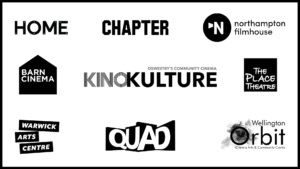



━━━━━━━━━━━━━━━━━━━━━━━━━━━━━━━━━━
“where I come from we don’t worry about where we come from”
This month on the Cinema of Ideas we welcome writer and researcher Jemma Desai, who will be considering the relationship between repetition and differentiation in film programming via Alnoor Dewshi’s short film Latifah and Himli’s Nomadic Uncle:
“So often we imagine the practice of programming as the quest for something new, something ‘great’, something ‘rare’. Yet at the same time, the rituals and ‘best practices’ of programming can be fixed, and formulaic. Film festivals, new release schedules and seasons cycle through content but rarely truly change their form, their language or mode of address.
How might repetition and discovery be set not in binary opposition but in connection; in relation? What might we ‘find’ when revisiting a work over and over again, examining it in different contexts, with different formats, in different registers of meaning and address? What might thinking with film programming as both an intentional and unintentional practice of repetition reveal about our relationships with time, subjectivity and choice in different programming contexts?
In Latifah and Himli’s Nomadic Uncle, two cousins converse on the repetition of relation across difference: the repetition of the question of identity for those in the diaspora, and the repetition of patterns of colonial extraction and plunder. It is also a film about repetition as difference: two girls whose distant ancestors were rural nomads circle around London unfixed in specific time or location. In different settings they meander around questions which have been circled around before, forming different answers on location and performing different selves depending on where they are and where they find themselves. Their desire to answer these questions, to address them ambivalently, prosaically, poetically or not at all, changes as the ‘where’ that they wander across (or decide to embody) changes.
Departing from the insights of Latifah and Himli’s nomadology, I return to this film which I have programmed many times before to consider it as a location of both repetition and differentiation. Through performance, collaborative writing, close reading and durational screening I will consider each context in which I chose to include Latifah and Himli as an archive of my programming selves – the many different versions of myself that have shown films – all embodying different political desires and ethics and resulting in different relational possibilities with collaborators, audiences, and myself.”
━━━━━━━━━━━━━━━━━━━━━━━━━━━━━━━━━━
Jemma will introduce the season through a performance lecture entitled “where I come from we don’t worry about where we come from” on 5 December after which the film will stream for two weeks. After Monday 19 December, you can watch the film for free on BFI Player.
The lecture will be followed on 7 December at 6pm (UK time) by a live conversation with Jemma about the season which will include a Q&A on the themes raised in the programme. Jemma will be in conversation with film and cultural relations consultant Jo Duncombe.
During the season Jemma will be exchanging voice, text and audio with artist Jack Ky Tan. At the end of the season a text of these exchanges will be shared reflecting on ideas of relation, repetition and practice in film programming and its relationship to wider arts administration.
━━━━━━━━━━━━━━━━━━━━━━━━━━━━━━━━━━
Jemma Desai is based in London. Her practice engages with film programming through research, writing, performance, as well as informally organised settings for deep study. She has previously worked with the BFI and British Council, and is interested in the ways imperialism replicates itself through institutionalised work processes. Notably on this subject, she created the project “This work isn’t for Us” which used theory, memoir and testimony to weave an auto ethnographic exploration of institutional racism in the UK arts sector in the form of writing, study groups, performances and moving image. She was co-chair of LUX, a UK based international arts agency that supports and promotes artists’ moving image practices and the ideas that surround them between 2017-22, the Head of Programming at Berwick Film & Media Arts Festival in 2021 is and is currently the chair of the feature film programming committee at Blackstar Film Festival for the 2022 edition.
Jo Duncombe is a film and cultural relations specialist, based between London and Marseille. Spanning creative production, film programming and new talent development, Jo has a wealth of experience developing innovative, international film and arts programmes. She cares deeply about connecting audiences to original storytelling through intrinsically global projects, and building thriving communities around creative culture. Through her work at British Council, she has developed a unique sensitivity to developing cultural programmes that connect artists and communities across many cultural contexts.
Jack Ky Tan makes work that explores the connection between the social, the legal and art. Using social relations and cultural norms as material, he creates works of visual, performance and participatory art that highlight the rules — customs, rituals, habits and theories — that guide human behaviour. Jack’s social practice also blurs the boundaries between art, governance and consultancy in order to help organisations reform and revision themselves using artistic thinking.
━━━━━━━━━━━━━━━━━━━━━━━━━━━━━━━━━━
Help support independent cinemas by selecting one of our partner venues at checkout.

━━━━━━━━━━━━━━━━━━━━━━━━━━━━━━━━━━
Latifah and Himli’s Nomadic Uncle and the season introduction will be available with descriptive subtitles. The live conversation on Wednesday 7 December will be live-captioned.
This event is available to view worldwide. A recording of the conversation will be available to view on the platform from 7:00pm GMT on Wednesday 7 December until 11:59pm GMT on Monday 19 December.
A short film, performance, and conversations exploring the relationship between repetition and differentiation in film programming
Streaming until 31 December